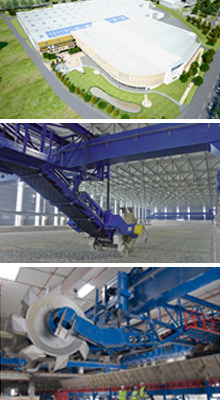EXCLUSIVE: Environment Agency data shows Essex county council landfilled 213,000 tonnes of household waste in 2015/16 – with the long-term future of output from the Basildon MBT plant still to be decided.
The authority has yet to procure any long-term offtakers for solid recovered fuel (SRF) due to be produced at the mechanical biological treatment facility, which began commissioning in November 2014 and is now running 18 months behind schedule.

(Top down): An artist’s impression of UBB’s Basildon MBT plant, the TAIM WEISER composting equipment as pictured in Valencia, and, the equipment used in Barcelona
Essex households generated 740,000 tonnes of waste in 2015/16, according to annual data released by the Environment Agency in December, 50% of which was recycled or composted.
Of the remaining waste, 213,000 tonnes was landfilled and 118,000 tonnes exported for ‘incineration without energy from waste’ according to the Environment Agency.
UBB
Residual waste generated by the county is managed under a 25-year PFI waste treatment arrangement with Spanish-owned consortium Urbaser Balfour Beatty – UBB Waste (Essex) – in 2012, worth over £919 million across its lifespan (see letsrecycle.com). The contract was also signed by the unitary Southend borough council as part of the Essex Waste Partnership, which was awarded £100.9 million in waste infrastructure credits (previously known as PFI) by Defra in 2009.
The contract sees UBB responsible for building and operating a plant capable of annually treating up to 420,000 tonnes of the councils’ municipal residual waste, business waste, bulky waste including sofas and beds, street sweepings and HWRC waste.
Under the contract, SRF produced at the plant passes to authority ownership once the facility has completed commissioning.
Commissioning
Built at Courtauld Road, Basildon, the plant began commissioning in November 2014 with testing of the technology due to take ’12-18 months’, according to the council. However, although some SRF has been produced it is still only generating around half of the estimated 180,000-220,000 tonnes per year output that was expected annually through the UBB contract.
And, the actual status of the SRF material produced so far is unclear. The county councils refers instead to RDF (refuse derived fuel) in meeting agendas, noting that “in 2014 it let a short term contract to a waste management company to dispose of the RDF (which is a low quality SRF) produced during the testing and commissioning phase. The waste management company disposes of the RDF by exporting the RDF to merchant energy from waste facilities in mainland Europe”.
According to UBB, recyclable waste is removed during pre-processing at the MBT, with the remaining waste moved to maturation halls where it is treated using a ‘compost-like’ process. The material is screened to produce either a stabilised output material or SRF, both of which have less weight and volume than waste brought on site. The stabilised output material is ‘likely to go to landfill’ as biodegradable waste.
TAIM WEISER
Three ROTOPALA processing lines for the MBT plant have been supplied by TAIM WEISER, a Spanish-firm which also supplied the machinery in revisions to the Amey Waterbeach facility in Cambridgeshire.
According to TAIM WEISER, the company ‘proved its reliability and capability to Urbaser’ citing working plants in Valencia and Barcelona as well as its first ROTOPALA installation in Germany.
While UBB declined to comment on the delays in commissioning, an annual report for the year ended 31 December 2015 reveals that UBB Waste (Essex) Limited “re-measured the PFI asset to reflect the impact of a delay in the construction, and the impact of liquidated damages” which will be charged. As a result of the re-measurement, there was an “overall negative revenue recognised in the year ended 31 December 2015 of £10,248,000”.
“The commissioning phase is designed to enable any issues with the operation of the plant to be addressed.”
Essex county council
Commenting on delays at the plant, including local reports of high dust levels inside the facility, an Essex county council spokesperson told letsrecycle.com this week: “The Basildon MBT plant is in its commissioning phase. The plant is operational, and diverting considerable waste from landfill. The commissioning phase is designed to enable any issues with the operation of the plant to be addressed.”
SRF offtakers
The county council has meanwhile delayed identifying long-term offtakers for SRF from the site until 1 April 2019, despite ‘incurring costs’ to see it treated in Europe, on top of the landfill gate fees it already pays.
In September 2015, the council’s cabinet met to consider a report into long-term SRF disposal for the county.
Three options were listed: consigning the waste to landfill, disposing of SRF by way of merchant energy from waste plants, or building a new 500,000 tonne capacity energy recovery facility, via a public private partnership, to treat it locally for the remainder of the 25-year arrangement.
Merchant EfW
The council resolved to enter into medium-term, 10-year service contracts with merchant facilities, commencing in 2019/2020, spread over ‘multiple 50,000 tonne lots’. It was recommended that the procurement was postponed until commissioning at Basildon had been completed.
Agenda papers for the meeting also show that the merchant energy option had been recommended ‘in light of the build time of likely solution providers’.

An artists’ impression of Wheelabrator Technologies energy-from-waste facility in Sittingbourne, which will be in the vicinity of Essex
Should the local authority look to the domestic market for contractors, merchant EfW plants currently in planning or construction phase in the vicinity include Gent Fairhead & Co.’s Rivenhall Airfield facility, Clean Power’s proposed advanced thermal treatment Thames Haven plant in Thurrock, and Wheelabrator and DS Smith’s EfW across the river in Sittingbourne, Kent.
The export market, as happens now, would be considered by the council and a range of potential businesses are expected to be interested.
Rivenhall
Gent Fairhead’s Rivenhall plant, which was awarded planning permission by Essex county council in 2010, has already been identified as one of 19 potential commercial waste sites in the council’s Replacement Local Waste Plan – currently out to public consultation.
Last year, the company successfully applied to the council for a planning variation to increase the amount of SRF for incineration from 360,000 tonnes to 595,000 tonnes while reducing AD and MBT inputs (see letsrecycle.com story). The variation report claimed this change would make it ‘technically possible’ to accept fuel from the Basildon facility, though no contract has been signed.
Stack
Gent Fairhead has now confirmed it will be amending the stack height of the EfW plant having been turned down for an environmental permit by the Environment Agency last month. The setback is expected to bring further delays to completion and delivery of the facility.
When contacted by letsrecycle.com, Essex county council said the Rivenhall application was ‘separate’ from its own municipal agenda.
Essex county council said: “The Environment Agency’s decision to refuse an application from the operators of the Rivenhall plant is for them to comment on, but this application is separate to and therefore does not impact on the County Council’s waste strategy.”
The post Essex waste sent to landfill with MBT delays mounting appeared first on letsrecycle.com.
Source: letsrecycle.com Waste Managment



